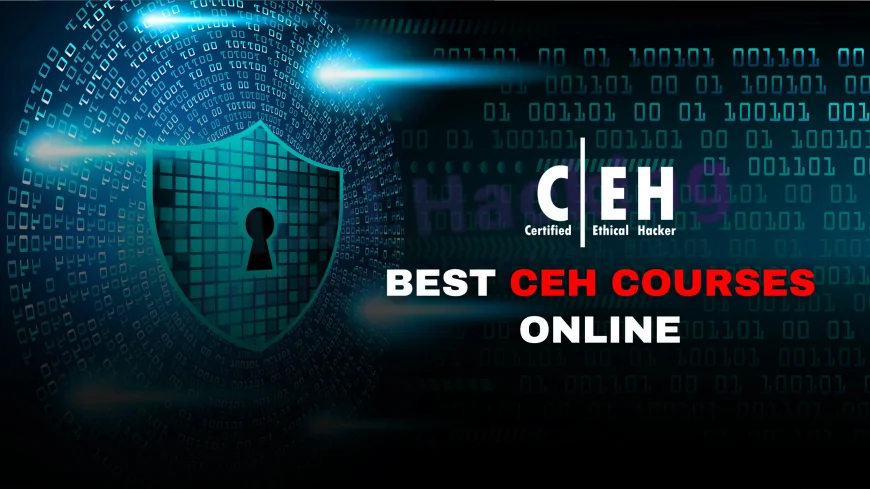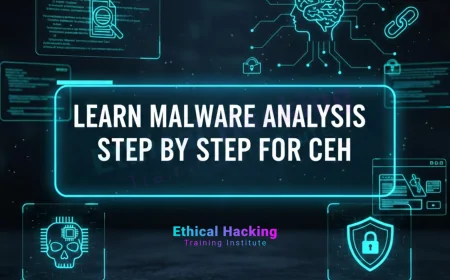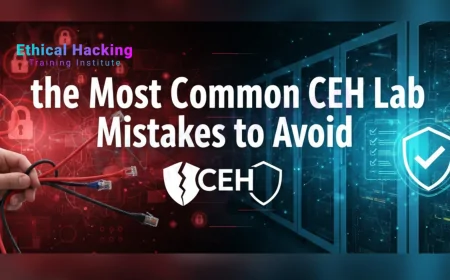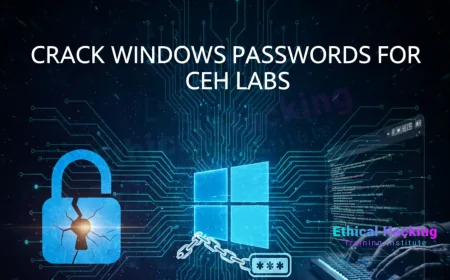CEH Cyber Security: Combining Ethical Hacking with Security Knowledge | How Ethical Hacking via CEH Complements Your Cybersecurity Career
Learn how CEH combines ethical hacking with cybersecurity skills. Master attack and defense techniques to boost your security career in 2025.

Table of Contents
- Introduction
- What Is CEH in Cyber Security?
- Ethical Hacking vs Security Knowledge
- Key Combined Skills in CEH Security
- CEH Curriculum & Modules
- Hands‑On Labs & Practical Training
- Essential Tools and Platforms
- Career Paths and Impact
- How to Prepare for CEH
- Certification and Exam Structure
- Beyond CEH: Next Steps
- Frequently Asked Questions
- Conclusion
Introduction
The landscape of cybersecurity has evolved dramatically. No longer is simply knowing how to patch systems sufficient—understanding how hackers think and act is crucial. The Certified Ethical Hacker (CEH) qualification by EC-Council uniquely bridges ethical hacking with comprehensive security knowledge. This article explores how CEH equips practitioners to both attack and defend, the curriculum, tools, career outcomes, and why CEH matters for cybersecurity practitioners in 2025.
What Is CEH in Cyber Security?
The CEH credential validates that an individual can think like a hacker while possessing deep security knowledge. CEH v13 covers the latest attack vectors—from cloud and IoT to AI-driven threats—while reinforcing defensive mindsets and awareness of mitigation techniques. It aligns with global frameworks like NICE and DoD 8570/8140, marrying offensive strategy with secure best practices.
Ethical Hacking vs Security Knowledge
- Ethical Hacking: Focus on finding and exploiting vulnerabilities.
- Security Knowledge: Emphasizes prevention, detection, and response.
- CEH fuses both: practitioners learn to break in and to build solid defenses, enabling holistic cybersecurity.
Key Combined Skills in CEH Security
- Reconnaissance & Defense Mapping: Gathering hacker intelligence and using it to build better monitoring.
- Vulnerability Assessment & Remediation: Not just identifying weaknesses but applying fixes.
- Exploitation & Detection: Using exploit frameworks and writing detection signatures.
- Privilege Escalation & Hardening: Learning attack paths and securing systems.
- Web & Application Attack/Defense: Mastering OWASP Top 10 threats and related defense techniques.
- Cloud and IoT Threats and Safeguards: This section teaches how to exploit weak configurations in cloud and IoT devices while reinforcing systems with security standards.
CEH Curriculum & Modules
- Introduction to Ethical Hacking
- Footprinting and Reconnaissance
- Scanning Networks
- Enumeration
- Vulnerability Analysis
- System and Network Attacks
- Web Application Hacking
- SQL Injection, XSS, CSRF
- Wireless, IoT, OT Attacks
- Cloud Penetration Testing
- Cryptography & Defense Techniques
- Social Engineering
- Evading IDS/IPS, Firewalls
Each offensive module correlates to defense topics—e.g., learning about SQL injection also includes securing databases and deploying WAFs.
Hands‑On Labs & Practical Training
EC-Council’s iLabs environment provides over 100+ real-world labs, including: system hacking, wireless cracking, web exploitation, cloud breaches. Students get sandboxed environments to learn attack and mitigation techniques concurrently.
Essential Tools and Platforms
- Nmap, Netcat, Amass for reconnaissance
- Burp Suite, OWASP ZAP for web testing
- Metasploit, Cobalt Strike for exploitation
- Wireshark, Snort/Suricata for packet and alert analysis
- Cloud-specific tools like ScoutSuite and Prowler
- Scripting: Python, PowerShell for automation
Career Paths and Impact
- Penetration Tester with defensible reporting
- Security Analyst / SOC with insight into attacker behavior
- Cloud Security Engineer
- Red Team vs Blue Team specialist or Purple Team strategist
- Security Architect understanding both offense and defense
CEH holders often earn ₹8–15 LPA mid-level, ₹15–30 LPA for specialized roles in India; global salaries range ₹50 k–120 k USD.
How to Prepare for CEH
1. Understand the CEH Exam Structure
-
Exam Name: CEH v13 (latest as of 2025)
-
Format: Multiple-choice (125 questions)
-
Duration: 4 hours
-
Passing Score: ~70% (varies by exam form)
-
CEH Practical Exam (6 Hours): An optional, immersive test featuring real-life ethical hacking tasks.
2. Meet Eligibility Requirements
-
Option 1: Start with EC-Council’s instructor-led course—perfect for newcomers.
-
Option 2: Submit proof of 2 years of InfoSec experience and get approval from EC-Council
3. Use EC-Council Authorized Training
Choose from:
-
iClass (Official Online Instructor-Led Training)
-
Accredited Training Centers (ATCs)
-
EC-Council's iLabs for hands-on practice
These official programs ensure access to:
-
Updated courseware
-
100+ hands-on labs
-
Exam vouchers
-
Access to CEH Learning Portal
4. Study the Official CEH Curriculum
Focus areas include:
-
Footprinting & Reconnaissance
-
Scanning Networks
-
Enumeration
-
System Hacking
-
Malware Threats
-
Web Application Attacks
-
Wireless Network Attacks
-
Cloud Security & IoT
-
Cryptography
-
Social Engineering
-
Evading IDS/Firewalls
5. Practice in Labs
Use virtual labs to reinforce theory:
-
EC-Council iLabs: Sandbox environment with full attack/defense modules
-
TryHackMe / Hack The Box: Community-based practice environments
-
Kali Linux + Metasploit: Install locally and follow open-source CEH guides
6. Master Common Tools and Techniques
Be familiar with:
-
Reconnaissance Tools: Nmap, Maltego, Amass
-
Web Exploitation: Burp Suite, OWASP ZAP
-
Exploitation Tools: Metasploit, SQLmap, John the Ripper
-
Password Attacks: Hydra, Hashcat
-
Defense Tools: Wireshark, Snort, Suricata
-
Scripting: Basics of Python, Bash, and PowerShell
7. Use Study Resources
-
CEH Official Study Guide (EC-Council Press)
-
Boson Practice Exams – High-quality simulations
-
CEH Exam Blueprint – Directly from EC-Council website
-
YouTube Channels & Podcasts – Practical walkthroughs and insights
8. Join a Cybersecurity Community
Being active in forums or communities helps with:
-
Study accountability
-
Sharing tips on difficult modules
-
Networking for job referrals
Recommended communities:
-
Reddit: r/ceh / r/netsecstudents
-
LinkedIn CEH Study Groups
-
Discord / Telegram Ethical Hacking Groups
9. Prepare for CEH Practical (Optional)
-
Practice 20+ scenarios (system hacking, privilege escalation, file transfer, etc.)
-
Get comfortable working under time pressure
-
Document steps & screenshots as you go (essential for reporting skills)
10. Take Mock Tests
-
Simulate real test conditions (125 questions in 4 hours)
-
Identify weak areas and focus on revision
-
Use timed quizzes and test engines
Bonus: CEH Exam Tips
-
Memorize common ports, tools, and commands
-
Understand the attacker lifecycle
-
Focus on identifying vulnerabilities AND how to fix them
-
Don’t just memorize—practice and apply
Suggested Preparation Timeline
| Duration | Task |
|---|---|
| Week 1–2 | Understand exam topics, set up labs |
| Week 3–6 | Deep dive into each module + practice |
| Week 7–8 | Full lab practice + tools mastery |
| Week 9 | Take multiple mock exams |
| Week 10 | Review weak areas, exam strategy |
Certification and Exam Structure
- CEH Theory: 125 multiple-choice questions, 4 hours duration.
- CEH Practical: 6-hour lab with 20 real-world challenges—optional but recommended.
- CEH v13 aligns with MITRE frameworks and includes new AI/cloud content.
Beyond CEH: Next Steps
- Penetration Testing with OSCP
- Red/Blue team certifications: e.g., GPEN, GCIH
- Cloud-specific security certs like CCSP
- Specialized paths: OSCE (exploit dev), eMAPT (mobile)
- Leadership certs: CISSP/CISM for architecture and governance roles
Frequently Asked Questions (FAQs)
1. What is the main focus of CEH?
CEH focuses on ethical hacking techniques combined with security best practices to defend systems.
2. Is CEH v13 updated for 2025?
Yes, with content on cloud, IoT, AI and updated lab exercises aligned with modern threat landscapes.
3. Do I need experience to take CEH?
No—official training waives the requirement, otherwise 2 years' IT/security experience is recommended.
4. What is iLabs?
EC‑Council’s virtual lab platform with real-world environments covering attacks and defenses.
5. Is CEH recognized globally?
Yes—ANSI-accredited and compliant with industry frameworks like NICE and DoD standards.
6. How tough is the CEH exam?
Challenging—it requires understanding theory, tools, and labs. Preparation is essential.
7. Is CEH Practical worth doing?
Absolutely—it proves real-world skills and improves employability.
8. What jobs can I get after CEH?
Pen tester, SOC analyst, security engineer, cloud security specialist, or red teamer.
9. How much does CEH cost?
Costs vary: ₹70–100 k in India (training + exam); similar USD pricing globally.
10. Do I need scripting?
Yes—Python or PowerShell helps automate tests, parse logs, and write basic tools.
11. What tools will I master?
Nmap, Metasploit, Burp Suite, IoT/cloud-specific scanners, Wireshark, and IDS tools.
12. Can CEH help me defensively?
Yes—it teaches you how to detect, respond to, and prevent attacks by knowing attacker mindset.
13. How often is renewal needed?
Every three years—by earning EC-Council CPE credits or re-taking the exam.
14. Can I do CEH self-study?
Yes—books, labs, community resources can prepare you, but official training provides iLabs access.
15. How long does it take to prepare?
Typically 2–3 months with dedicated study and lab practice.
16. Should I follow CEH with OSCP?
Yes—OSCP builds deeper technical skills beyond the breadth-focused CEH.
17. Does CEH include report writing?
Yes—the exam and labs require professional-quality penetration test documentation.
18. Is CEH suitable for managers?
Yes—CEH helps managers understand risk, defense strategy, and adversary behavior.
19. How do I practice labs?
Use EC‑Council iLabs, TryHackMe, and replicate environments locally via VMs.
20. What if I fail the exam?
You can retake the exam—they offer exam vouchers with training bundles.
Conclusion
CEH uniquely combines offensive mindset with defensive knowledge—training professionals not only how hackers operate but how to anticipate and neutralize attacks. By mastering both sides, CEH-equipped practitioners become invaluable assets in organizational cybersecurity. In 2025, this dual perspective is key to securing networks, systems, and data, making CEH an essential credential for any cybersecurity-conscious professional.
What's Your Reaction?
 Like
0
Like
0
 Dislike
0
Dislike
0
 Love
0
Love
0
 Funny
0
Funny
0
 Angry
0
Angry
0
 Sad
0
Sad
0
 Wow
0
Wow
0

















